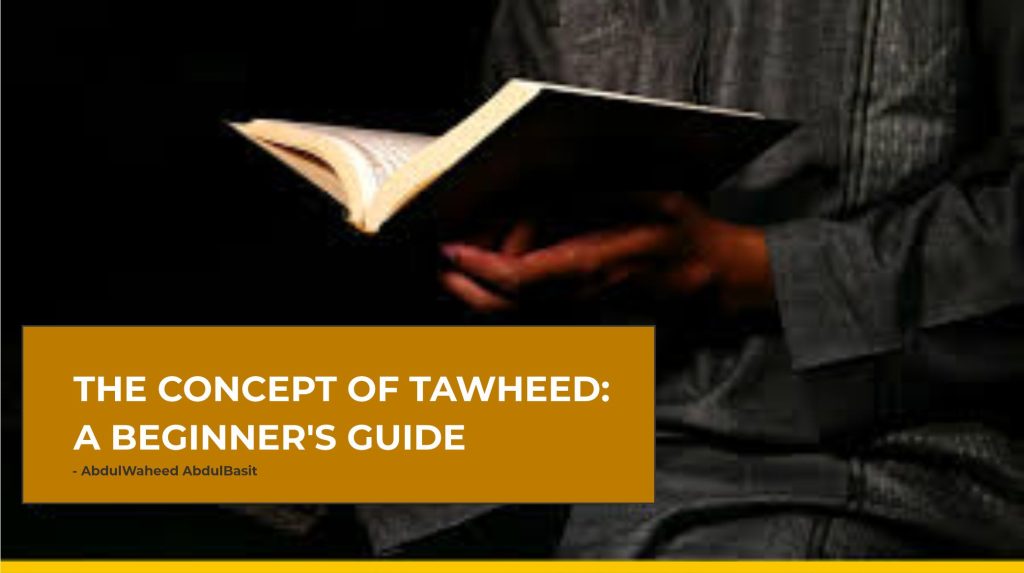Written by: AbdulWaheed AbdulBasit
Introduction
“Tawheed” in English means: “monotheism” or “unification”. It is the act of singling Allah (Subhaanahu wa ta’aala) in worship. The direct opposite of it is Shirk. “Shirk” translates to “polytheism”, and it is the act of associating partners with Allah. The greatest commandment Allah has enjoined is Tawheed, which is “to worship Allah alone”, and the greatest thing he has prohibited is Shirk (polytheism), which is “to take others as partners with Him.”
Allah has not sent any messenger except to convey the importance of Tawheed, and to warn that if one errs in this matter, all their deeds will be rendered worthless, which can be a great loss. Allah says in the holy Qur’an:
“We did raise a messenger among every people, with the message: Worship Allah and stay away from the Rebel (the Shaytan).” — Surah An-Naḥl, verse 36.
He states in another verse:
“We did not send any messenger before you (Muhammad) but revealed to him that there is no god but I, so worship Me.” —Surah Al-Anbiyāʾ, verse 25.
Based on these verses and others like them, scholars have classified Tawheed into three major categories, and a failure in any of them is considered a failure in all.
Categories of Tawheed
The three categories of Tawheed are:
- Tawheed Ar-rubūbiyyah
- Tawheed Al-ulūhiyyah
- Tawheed-ul asmaa’ was-sifaat
Now, let us explore each category in detail.
- Tawheed Ar-rubūbiyyah
Tawheed Ar-rubūbiyyah involves making Allah the sole authority in His Lordship, and in His actions towards his servants. This includes acknowledging that Allah is the sole provider, protector, and controller of all affairs. As such, a Muslim should not believe that anyone other than Allah is capable of these actions.
Interestingly, almost half of the Muslim population does not struggle with this aspect of Tawheed, as even disbelievers acknowledge that there is a supreme being controlling the universe. As Allah says in the Qur’an:
“And if you ask them who has created the heavens and the earth, they will certainly say, “Allah.” Say, “Alhamdulillāh ” (Praise be to Allah). But most of them do not know.” —Surah Luqmān, verse 25.
Another verse states:
“Allah is the One who created you, then gave sustenance to you, then He will make you dead, then He will make you alive. Is there anyone from your (so-called) ‘partners of God’ who can do anything of that kind? Pure is He, and far higher than what they associate (with Him).”—Surah Ar-Rūm, verse 40.
- Tawheed Al-ulūhiyyah.
Tawheed Al-ulūhiyyah involves directing all acts of worship solely to Allah. Unlike the first one, this has to do with the actions of servants towards their Lord (Allah). This includes acts like: Salāh (prayer), Du’aa (supplication), Sawm (fasting), Isti’aana (seeking help), Istighātha (seeking protection from evil), to mention but a few. A Muslim, while engaging in any act(s) of worship, should make his intention solely for Allah and direct none of his worship to anyone other than Him. This is the implication of Allah’s word in the Qur’an:
“Your Lord has decreed that you worship none but Him…”— Surah Al-Isra verse 23.
Worshipping only Him, and none other than Him. Otherwise, the consequence of that is the nullification of one’s actions, as it renders all worship invalid in the sight of Allah. This is evident in the hadith of Abu Hurayra (may Allah be pleased with him), who said the Messenger of Allah (Sallallahu alayhi wa sallam) said: “Allah (Subhaanahu wa ta’aala) said: ‘I am the most independent of partners. Whoever does a deed in which he associates others with Me, I will abandon him and his associate.” — Sahih Muslim, Hadith 2985
One would be associating partners with Allah if he is either primarily performing the action for someone other than Him, or performing it for Him (Allah) and another person. Allah does not tolerate that in the least. Only Him should be intended. Only Him should be worshipped. This is why scholars often stress this category (Tawheed Al-ulūhiyyah) and the ultimate one (Tawheed-ul asmaa’ was-sifaat) more than the first one (Tawheed Ar-rubūbiyyah).
The last category of Tawheed is:
- Tawheed-ul asmaa’ was-sifaat (The Tawheed of names and attributes).
Tawheed-ul asmaa’ was-sifaat involves calling Allah by the names He has revealed for Himself, and attributing to Him the adjectives that He has used to qualify Himself. A Muslim should believe in these names and attributes and unify them to Allah (Subhaanahu wa ta’aala). The Prophet (Sallallahu alayhi wa sallam) says:
“Allah has ninety-nine names, one hundred minus one; whoever preserves them will enter paradise”, — narrated by Bukhari (7392) and Muslim (2677).
The names the Hadith speaks of are beautiful and nice (Al-asmaa’ul husnaa). As such, anyone who wants to bear any of the names of Allah will not bear it directly without preceding it with “Abdu” (the servant of). For example, “Ar-Rahman” (the merciful) is a name of Allah (as evident in the Qur’an). So, “Abdur Rahman” (the servant of Ar-Rahman) is what others would bear, and so on.
Furthermore, Allah describes Himself with certain attributes in the Qur’an such as having hands and being all-hearing and all-seeing:
“In fact, His hands are outspread. He spends as He wills.” —Surah Al-Māidah verse 64
“Nothing is like Him. And He is the All-Hearing, the All-Seeing.”— Surah Ash-Shūrā verse 11.
In essence, a Muslim should acknowledge these attributes without questioning their nature or comparing them to human attributes. He should not say: “How does it look?”, “Does he have ears and eyes to see us?” and so on. Questions like that are from Shaytan. May Allah protect us from his evil plots.
Closing Thoughts
Muslims should understand the concept of Tawheed as it is a determinant of the validity of the deeds and whether or not Allah will accept them. The Prophet has guaranteed that anyone who perfects his Tawheed will have his intercession on the Day of judgement and will eventually enter paradise.
Abu Hurayra asked the Prophet: “Who will most likely earn your intercession on judgement day? Then he replied: “Whoever says: ‘there is none worthy of worship other than Allah’ purely from his heart.”—Sahih al-Bukhari, hadith 99.
Jaabir bn Abdillah (may Allah be pleased with him) also narrated: “Whoever meets Allah while associating none with Him, enters the paradise…”— Sahih Muslim, 93.
May Allah guide us to understand and implement Tawheed in our lives and make us among the people of monotheism and sincerity. Aameen.
***Abdulwaheed Abdulbasit is a teen writer, debater, a Qur’an memoriser, and a student of Islamic knowledge. He is set to pursue Common and Islamic Law at the University of Ilorin, where his passion for learning and contribution continues to grow.


